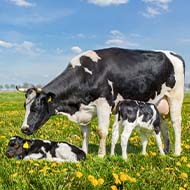New embryo identification IVF method in Cattle discovered

The breakthrough is set to reduce pregnancy issues in cows.
Researchers from the University of Kent, the University of Nottingham and L'Alliance Boviteq Inc have established a method of significantly improving in-vitro fertilization in cattle.
Advanced programmes have been able to identify embryos with traits including disease resistance, food conversion and improved meat and milk production.
The researchers discovered a new way to identify a subset of embryos that rarely lead to a live birth – those with a less than 5 per cent chance – due to carrying chromosome disorders. The study found that this process improved overall pregnancy rates in cattle by 7.8 per cent after analysing 1,713 embryos.
It is thought that this new research could inform future treatment in fertility clinics for humans, with preimplantation genetic testing for aneuploidy being one of the most debated areas of reproductive medicine in humans.
Professor Darren Griffin, senior author of the paper and professor of genetics at the University of Kent, told the University of Kent News Centre: “This new PGT-A method of embryo identification will be an enormous boost for the cattle production industry and will also be the platform for further research into this vital science, for which we anticipate seeing the benefits especially in fertility clinics.”
Published in Cells, 'Preimplantation Genetic Testing for Aneuploidy Improves Live Birth Rates with In Vitro Produced Bovine Embryos: A Blind Retrospective Study' is free to read.



 The Veterinary Medicines Directorate (VMD) is inviting applications from veterinary students to attend a one-week extramural studies (EMS) placement in July 2026.
The Veterinary Medicines Directorate (VMD) is inviting applications from veterinary students to attend a one-week extramural studies (EMS) placement in July 2026.